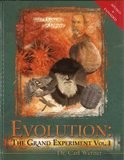News to Note, October 13, 2007
What can we learn from boasts of “artificial” life, a geological rush job, a Jurassic dragon, a not-so-useless organ, and the “fear” of evolution?
1. Guardian Unlimited: “I am creating artificial life, declares US gene pioneer”
According to Britain’s Guardian, a team assembled by DNA researcher Craig Venter is on the verge of creating artificial life in the lab.
DNA researcher Craig Venter is “poised to announce the creation of the first new artificial life form [sic] on Earth,” reported the Guardian last weekend on an announcement expected “within weeks.” A team assembled by Venter has already fashioned a synthetic chromosome in the laboratory using chemicals made in the lab. The chromosome is 381 genes long and was carefully “stitched” together by the team. It is based on the bacterium Mycoplasma genitalium and has been named Mycoplasma laboratorium.
If the chromosome can be transplanted into a living bacterial cell and successfully seize control of the cell, it will effectively be a unique life form, reports the Guardian. As expected, the idea of “creating” life (though life is not truly being created; perhaps “rebuilt” is a better word) is rife with ethical questions. Venter argues that his project is “a very important philosophical step in the history of our species” and that we will now have the “hypothetical ability to do things never contemplated before.”
Dr. Georgia Purdom, a fully qualified, in-house molecular geneticist for Answers in Genesis, took a close look at Venter’s claims this week, deconstructing, explaining, and commenting on this supposed creation of artificial life:
Keep in mind that life is not being created from “scratch.” The scientists are using their intelligence to do it! They are using a sequence for the man-made chromosome that is similar to a pre-existing bacterial chromosome, using pre-existing DNA bases to make the man-made chromosome, and putting the chromosome into a pre-existing bacterial cell. All the pre-existing items were created by God!
To read the rest of her expert analysis, visit Have Scientists Created a New Life-form in the Lab?
For more information:
2.
When the spillway to Canyon Lake in Texas overflowed five years ago, the resulting torrent sliced through layer after layer of rock in just three days, creating a canyon that looks like a miniature of the Grand Canyon in Arizona.
3. Ireland's Sea Dragon
Found in Colin Glen, an area described by park ranger Paul Bennett as “rich in fossils and [...] of great geological interest,” the 2 3/4-inch (7 cm) section of backbone is from a plesiosaur said to have lived more than 144 million years ago and possibly as long as 190 million years ago.
4. Appendix: Where the Good Bacteria Live
Surgeons and immunologists at Duke University Medical School, whose hypothesis was published in an online edition of the Journal of Theoretical Biology, suggest that the job of the appendix is to produce and protect beneficial germs for use in the intestines.
5. BBC News: “Teachers ‘fear evolution lessons’”
The teaching of evolution in schools continues to become more stress-ridden for instructors, reports the BBC. In a new book, a scientist who also serves as a Church of England priest argues against putting creation and evolution education on the same level.
Michael Reiss, head of science at the Institute of Education in London, warns that pupils could leave school with “gaps in their scientific knowledge” because of the influence of creationism. Reiss estimates (on what basis, the article does not say) that one in 10 individuals in the UK accepts the literal truth of the creation accounts in the Koran or Bible. He adds that both Christian and Islamic creation movements have resulted in an increasingly difficult environment for evolution education, arguing in particular that:
The number of Muslim students has grown considerably in the last 10 to 20 years and a higher proportion of Muslim families do not accept evolutionary theory compared with Christian families.
In a new book, Teaching about Scientific Origins: Taking Account of Creationism, Reiss argues that instructors should “tackle the issue head-on, whilst trying not to alienate students.” He added, “By not dismissing their beliefs, we can ensure that these students learn what evolutionary theory really says—and give everyone the understanding to respect the views of others.”
But apparently “not dismissing” creation beliefs isn’t the same, to Reiss, as putting creation and evolution on equal footing. The BBC includes Reiss’s qualification that “any teaching should not give the impression that creationism and the theory of evolution are equally valid scientifically.”
In other words—as we’ve seen in other jurisdictions—it’s perfectly fine to believe in a creation story, so long as you don’t assert that the story has any scientific basis. That is what is meant by “respec[ting] the views of others.”
In Reiss’s defense, he is suggesting a less dictatorial way of handling the issue of origins education as the classroom debate continues to grow; many of his opponents cling to a more rigid defense of evolution in the classroom. For example, Hilary Leevers of the Campaign for Science and Engineering argues that “Further discussion of creationism should occur in religious education as it is a belief system, not one based on science.” Of course, the presuppositions underlying evolutionary theory are just as much a “belief system” as other religious presuppositions, as Ken Ham clearly describes in “Evolution Is Religion.”
Additionally, this quote from the article demonstrates the bias pretty clearly: “But Prof Reiss argues that there is an educational value in comparing creationist ideas with scientific theories like Darwin's theory of evolution because they demonstrate how science, unlike religious beliefs, can be tested.” Note how creationists have “ideas,” how “scientists” have “theories,” and how “Darwin's theory of evolution ... can be tested.” Never mind scientists who are creationists and who have creationist theories that can be tested scientifically (one example being the RATE project). Or the fact that you can’t objectively test origins—and that what is testable of evolution theory, i.e., natural selection, is something creationists also accept.
It is encouraging to hear that pupils are continuing to raise questions about evolution in the classroom, despite authorities’ attempts to stifle honest inquiry. While Answers in Genesis does not condone mandating educators to teach creation (such policies would inevitably result in evolutionists mis-teaching creation theory), we do strongly believe students and teachers should have the academic freedom to discuss the weaknesses and presuppositions inherent in Darwinism. But no matter what level of academic freedom is allowed in the science classroom, it is the ultimate responsibility of parents, pastors, and lay leaders to clearly explain the reliability of Genesis—and all of God’s Word—to each new generation.
For more information:
6. English Priest Denies Scientific Validity of Creationism
Michael Reiss, head of science at the Institute of Education in London, warns that pupils could leave school with “gaps in their scientific knowledge” because of the influence of creationism.
For More Information: Get Answers
Remember, if you see a news story that might merit some attention, let us know about it! (Note: if the story originates from the Associated Press, FOX News, MSNBC, the New York Times, or another major national media outlet, we will most likely have already heard about it.) And thanks to all of our readers who have submitted great news tips to us. If you didn’t catch all the latest News to Know, why not take a look to see what you’ve missed?
(Please note that links will take you directly to the source. Answers in Genesis is not responsible for content on the websites to which we refer. For more information, please see our Privacy Policy.)
Recommended Resources

Answers in Genesis is an apologetics ministry, dedicated to helping Christians defend their faith and proclaim the good news of Jesus Christ.
- Customer Service 800.778.3390
- Available Monday–Friday | 9 AM–5 PM ET
- © 2025 Answers in Genesis



